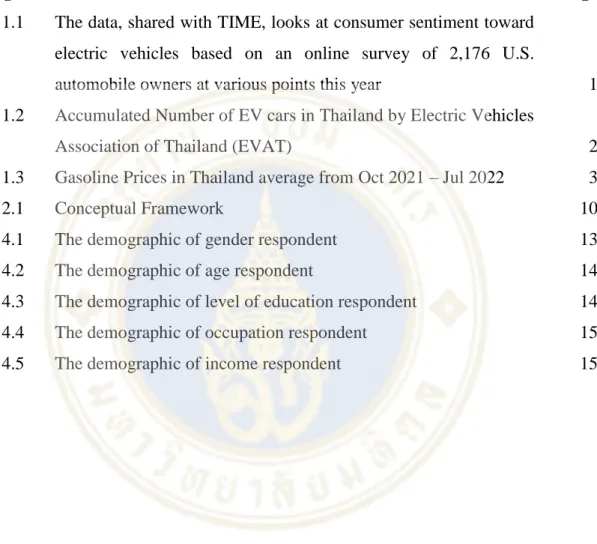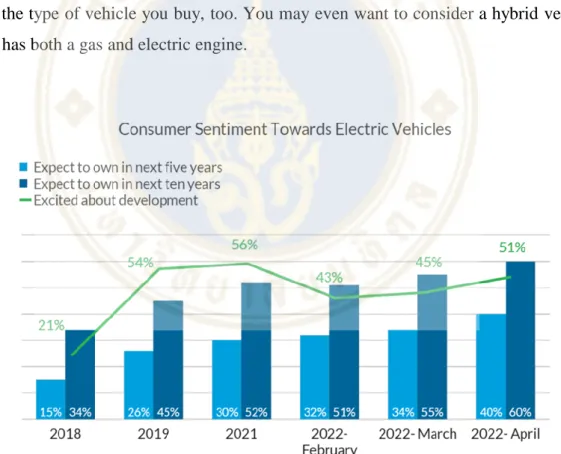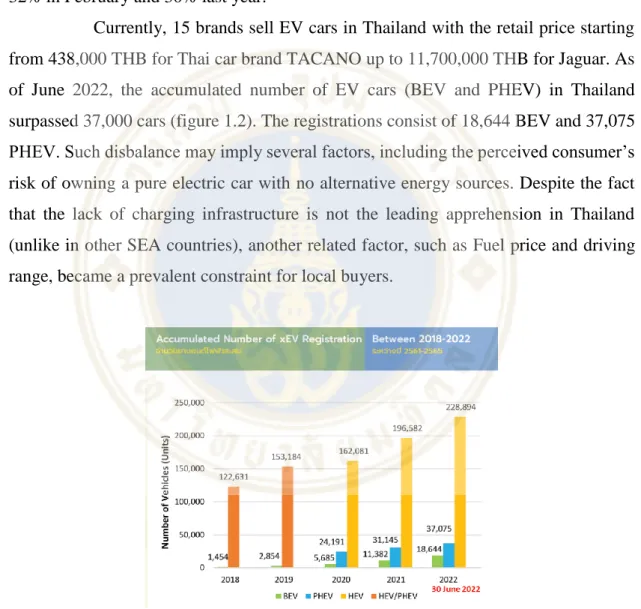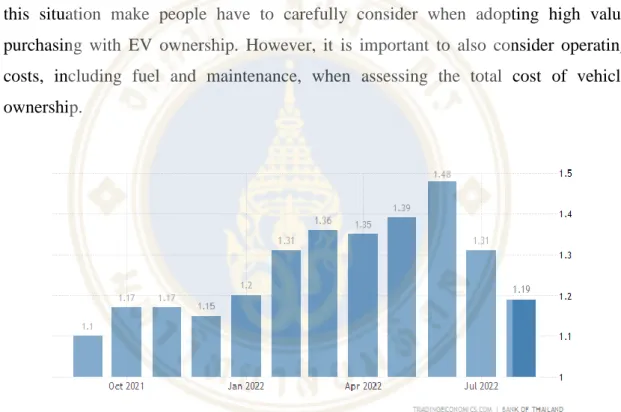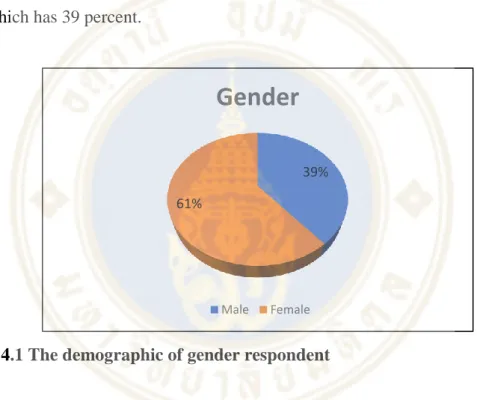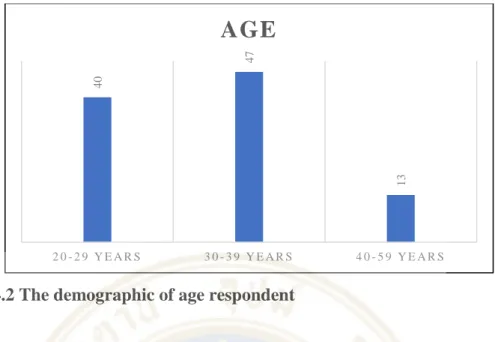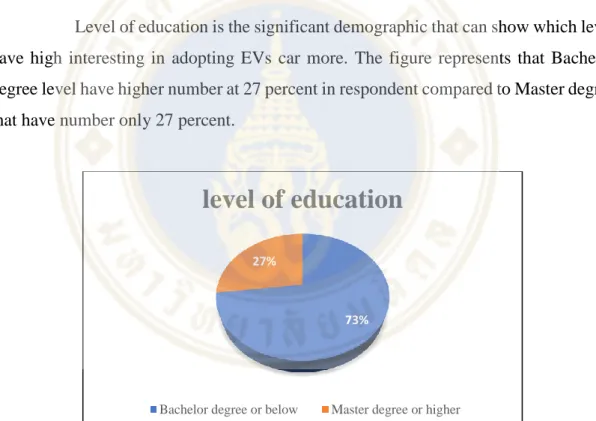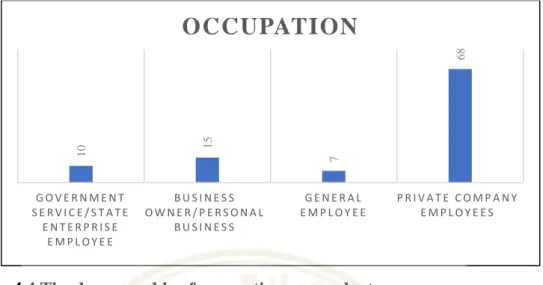I would like to express my deepest gratitude and appreciation to everyone who helped me to complete this study. The research objective of the study is to understand the factors that influence electric car owners to adopt the electric cars. Such an analysis would benefit various stakeholders in the electric car market, including the electric car company and manufacturers of charging equipment, government officials and electric car owners.
As a result, a survey was conducted on the main factors that play an important role in consumers adopting EV cars and to determine the significant differences in attitude within the consumer group in Thailand. But given that electric vehicles tend to be more expensive than gas cars and that electricity has its costs, is it actually cheaper to go electric? The data, shared with TIME, examines consumer sentiment toward electric vehicles based on an online survey of 2,176 Americans
Despite the fact that the lack of charging infrastructure in Thailand is not the main problem (unlike other SEE countries), another related factor such as fuel price and range became a dominant constraint for local buyers. Furthermore, how quickly consumers' real incomes grow relative to the growth of the fuel costs they have to afford. In this study, I would like to specifically discuss the factor of fluctuations in gasoline prices that have recently occurred all over the world. We can see in the figure above that this is related to the problem in many countries that is affecting the dramatic increase in fuel prices. unit prices of all fuel types increase over time between the years 2021 and 2022, with some exceptions towards the end of the year 2022.
Based on this question, I would like to conduct the survey to see how much and the perspective of people considering switching to electric cars due to gasoline price fluctuations.
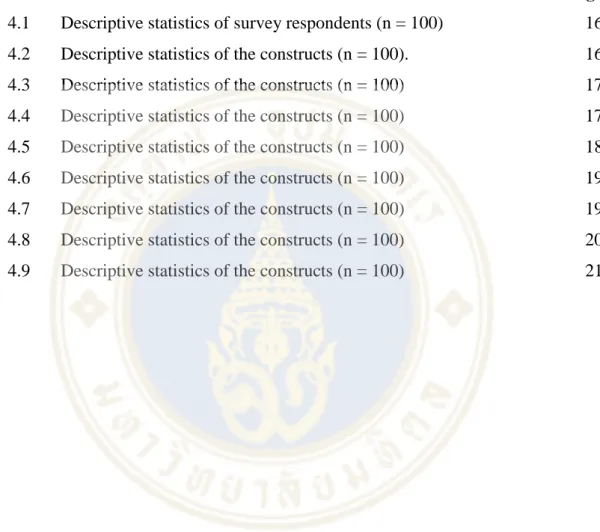
Objective of the study
Potential Output
LITERATURE REVIEW
Keyword/Variable
- Gasoline price (H1)
- Social influence (H2)
- Environment concern (H3)
- Cost effectiveness (H4)
Fuel price has been introduced as an influential predictor of the adoption of alternative fuel vehicles (Soltani-Sobh et al., 2016; Eppstein et al., 2011). Furthermore, fuel prices, both gasoline and diesel, are found to be the strongest predictors of EV adoption (Diamond, 2009; Beresteanu and Li, 2011; Gallagher and Muehlegger, 2011) and will similarly affect EV adoption depending on the relative price of electricity (Hidrue et al., 2011). In the continental US, the price of electricity is generally decoupled from the price of gasoline and diesel.
2014) found that financial incentives were significantly and positively correlated with a country's EV market share, while (Zhang et al. 2014) showed insignificant correlation between financial incentives and an individual's willingness to purchase EVs. It is realized that higher environmental concerns lead to a tendency to choose environmentally friendly products as well as brands (Junior et al., 2014), due to an increase in information and knowledge of environmental issues and green products. Customers who are environmentally sensitive and have identified themselves as an environmentally friendly person will be more likely to adopt EVs (Barbarossa et al., 2017; Krause et al., 2013).
Previous literature has suggested that, similar to performing altruistic actions (such as donating to charity), EV owners might experience a “warm glow” – “intrinsic emotional reward in [altruistic or] pro-environmental behavior” (Hartmann et al ., 2017; Sexton & Sexton, 2014) because they would feel that they have played a role in reducing CO2 emissions and preserving the environment. For example, in food retailing, customers are willing to pay a higher price for perceived high-quality or branded products (Anselmsson et al., 2014). The purchase price of an electric car is one of the financial factors that can influence the intention to purchase electric cars (Delang & Cheng, 2013; Lane & Potter, 2007).
The price of electric cars tends to be higher than conventional vehicles and can discourage the use of electric cars. The high price of the electric car is partly due to the high costs of the electric motor and Li-ion battery. Since EVs are not widespread and not many people have experienced them, people may not be able to correctly calculate the costs of ownership (e.g. operation and maintenance costs) (Rezvani et al., 2015).
They misrepresented the purchase price and expected fuel and maintenance savings (Krause et al., 2013). How the electricity bill costs of charging at the public charging station and at home would affect the total operating costs remains unclear to the public (Rezvani et al., 2015). They may fear resale (Banerjee & Pillania, 2009; Lim et al., 2014) because the secondary market for electric vehicles is still unpredictable.
Research Framework
The US public knowledge survey conducted in 2013 showed that two-thirds of respondents had incorrect basic facts about the advantages of EVs. Although car buyers may want to adopt EVs for the financial benefit of fuel economy, the benefit of investing in EVs may be limited if car buyers only use their EVs for a short distance (Degirmenci & Breitner , 2017). If there was a lack of demand for second-hand EVs, this would result in a low price for second-hand EVs.
This study aims to study the factors that attract customers to purchase electric vehicle cars towards environmentally friendly products such as electric vehicles in relation to various aspects such as gasoline price fluctuation, brand preference, environmental concern and cost effectiveness in Bangkok, Thailand.
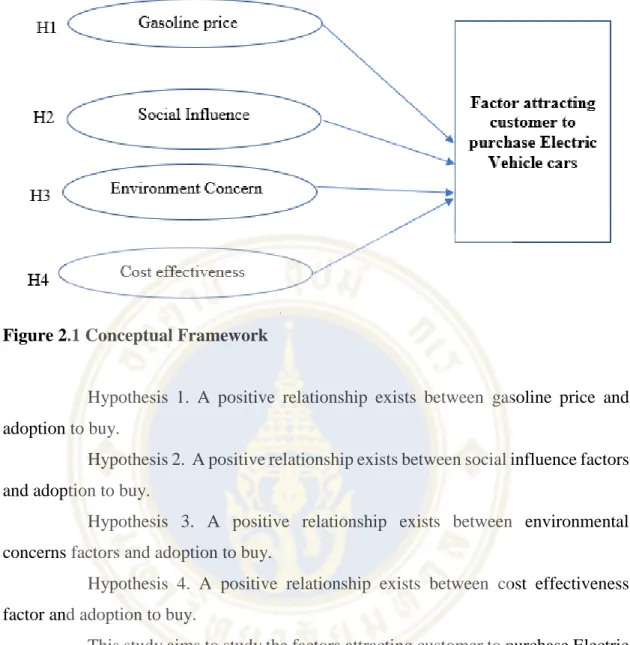
RESEARCH METHODOLOGY
Panel Data Regression Model
Panel data regression was chosen for the EV adoption analysis because this methodology offers various benefits and overcomes some of the limitations of time-series and cross-sectional studies (Kennedy, 2003). Panel data can account for the heterogeneity that results from variation in some unmeasured explanatory variables that affect people's behavior in different states. It also overcomes the problem of omitted time series variables that affect the behavior of people in different states uniformly but differently in each time period.
Panel data alleviate the problem of multicollinearity by creating more variability by combining variation between states with variation over time.
ANALYSIS AND RESULTS
Descriptive Statistics of Respondents Constructs
Gender
The significant number shows that with 39 percent who have income more than 30,000 to 45,000 Thai baht.
OCCUPATION
Income
Regression Analysis
Since we have purchase acceptance as the dependent variable, we have two variables that show a significant association with purchase acceptance. From the table of coefficients, the final result obtained shows that fuel price and social influence are significantly related to purchase acceptance. The top meaning of the fuel price topic is "Electric cars cut costs because they don't need fuel." And "electric cars run quieter than gasoline-powered cars" with a mean score of 3.28.
The highest average score of social influence topic is "Using electric cars makes me feel that it contributes to the reduction of air pollution and environmental problems." with 3.21 average score. For the correlation, we found that there are two variables that have a significant relationship with the dependent variable adoption to buy. First is the price of fuel with sig 2-tail at .002 and followed by Environment concerns with sig 2-tail at .002.

Conceptual framework conclusion
CONCLUSION, RECOMMENDATION AND LIMITATION
Conclusion
Recommendations
Limitation and Further Study
Retrieved November 5, 2022, from https://www.nrdc.org/stories/electric-vs-gas-it-cheaper-drive-ev.
APPENDICES
Appendix A: Questionnaire
Screening question 1. Have you use a car or not?
General questions
Factor Questions
